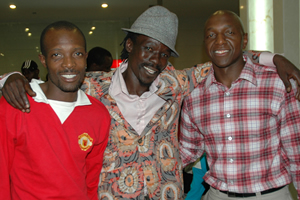Africa should shun Xenophobia

headlines. Recently, there were threats in Alexandra township, and not too long ago, Somali businesses were the target.
And of course, everyone remembers the tragic events of May 2008, when global headlines followed the horrific displacement of hundreds of thousands and the deaths of over 60 people as a result of xenophobic rioting. Yet, what’s missing from the media and the public eye is the everyday harassment and indifference that migrants face from those who are expected to serve and protect them.
These everyday tragedies may not be enough to generate headlines, but they have a profound impact on the lives of men and women, their families, and the community as a whole. The African Diaspora Forum (ADF), an organisation that has been dealing with migrants’ problems and fighting xenophobia since 2008, receives regular complaints about abusive treatment. The calls received by the organisation’s helpdesk mostly revolve around the same complaints: the bad service from the Home Affairs department, the difficulty accessing basic services like health, and perhaps most worryingly, hostile behaviour or harassment by the police, the very people who are supposed to protect all people in the country.
When leaving their countries, whatever the reason, migrants expect to live in a safe place, where they feel free and protected. The same protection as guaranteed by the constitution towards both citizens and migrants: that is what the law states. However, it is only theory; meaningless words on a piece of paper. In reality, what happens is very different, if not the exact opposite of what the constitution says. Lack of safety and protection from officials remain a big problem for migrants living in South Africa face.
Both women and men face police victimisation, though given the kinds of complaints women tend to have, a trip to the police station may be more traumatic than for men. According to Marc Gbaffou, African Diaspora Forum founder and current chair, women migrants often complain that, for example, when they go to the police with injuries, whether they are in pain or traumatised after an attack, they wait for a long time at the police station before getting help.
Gbaffou adds that language is an additional barrier. “What makes it especially hard for migrant women to get help is the fact that they mostly do not speak proper English,” explains Gbaffou.
“One woman even reported that sometimes the policemen will look at each other and start laughing at the complainant.” Research clearly shows that all women in South Africa face problems when reporting to police stations, especially domestic or sexual assaults. Now imagine adding in the language barrier and xenophobic attitudes of some police.
While no significant studies have been conducted, it’s easy to assume that the nationally accepted statistic that one in nine women report rape would be significantly worse amongst migrant communities.
In her 2010 report, Double Jeopardy: Foreign and Female, Romi Sigsworth noted that there is no community or family protection for migrant women in South Africa and, because of the inaccessibility of the police (as a result of xenophobic attitudes and practices), there is no system to report domestic violence.
This also makes migrant women vulnerable to ongoing intimate partner violence. Yet, not only women face indifference and harassment by police. Daily harassment related to documents is perhaps one of the most frustrating daily nuisances for both women and men, especially since arrests occur even when the person has the correct documents allowing them to stay legally in the country.
Didier Kanza originally from Congo-Brazzaville, remembers how on a Friday night in Pretoria the police arrested him and asked for his identity papers. Kanza was carrying certified copies of his passport, but when he showed them to the two policemen, it did not change anything. They just grabbed him and said they wanted to see his original passport.
“I tried to explain that I could not afford to walk around with my passport,” he recalls. “I was scared either to lose it or get it stolen, that is why I had the copies certified.”
They started insulting him, using the often-heard refrain: “you foreigners came here to steal our jobs and our women.” This sentence was like a repeated song to his ears, a justification of their acts. They took him to a cell where he spent the weekend in jail, leaving only to go home on Monday morning. All people living in South Africa have the right to protection from violence, and women and men from the African diaspora are no different.- Genderlinks.
- Julie Ilondo is a Jo’burg based writer from DRC.









Comments